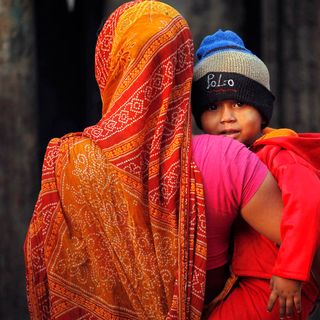
Controversial Crush: Ma Anand Sheela
An ode to a monochrome feminist icon.
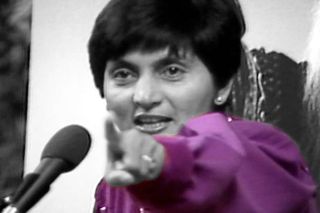
In the series Controversial Crush, we dote on controversial women and tell you why.
Have you seen Wild Wild Country? If not, go do that first. Because I’m about to make the argument that Ma Anand Sheela is a feminist hero, and it’s one giant spoiler.
Sure, she’s a convicted criminal who has been accused of far worse crimes than the ones she served time for. But in the aggregate, while I was watching the documentary about the short-lived but action-packed American chapter of the Osho Ashram, I had the sense I was discovering a feminist role model, flawed but awe-inspiring. Sheela was ahead of her time — full of raw ambition, self-assured sexual confidence, and motherly protective instincts, with no hint of insecurity about whether her various roles were compatible with each other or palatable to others.
Much of what makes Sheela’s story so remarkable is that her journey as a leader started when she was a recent college graduate, in 1970s Pune. That she took a leadership role in Bhagwan’s inner circle so quickly and adeptly at this young age, in a social milieu that typically would not have rewarded this as the preferred route for a young woman, is a viewer’s first sign that Sheela is utterly unconcerned with the boundaries of traditional gender roles.
At each stage of Bhagwan’s and the Rajneeshis’ journey, Sheela exhibits magnetism and leadership abilities beyond her years or life experience. When Bhagwan selects her to be his personal secretary and gives her responsibility for moving the ashram to the US, Sheela handles the move from Pune to a 50,000 acre ranch in Oregon — and builds an entire city, complete with an airport — as if she was packing up and moving down the street.
This woman is a total badass.
Throughout the four years in Oregon, as Bhagwan took a vow of silence and Sheela became the group spokesperson, she really began to shine. Like a tiger mother protecting her cubs, Sheela got increasingly defiant and defensive when the local community threatened the wellbeing of her brood. As the discord escalated, Sheela became the lone firebrand, defending the Rajneeshis’ constitutional and legal rights; her fiery temper on talk shows is intoxicating. You’re rooting for her because even though you know that sometimes she’s stepping over the boundaries of politeness — and it is likely to backfire — you sense that some level of fury is necessary to fight the injustice her community has suffered. Sheela cursed like a sailor on national television, and used a nation’s own laws to her benefit, without ever apologizing for being smarter, sassier, or crasser than her old, white male antagonists. Watching her in action, even 40 years later, she feels utterly revolutionary.
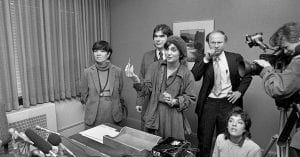
At its core, Wild Wild Country is a story of racism, xenophobia, and American cultural discomfort with anyone who pushed the boundaries of America’s white, patriarchal norms. In this context, Sheela — a small, young brown woman who refused to succumb to those norms, and fought against them defiantly and strategically — emerges as a particularly courageous example of speaking truth to power. What the documentary never explicitly states — but what becomes clear through the footage — is that Sheela’s skin color, nationality, and gender are likely what is so threatening to her new American neighbors. The Rajneeshi followers in the US are, for the most part, white, and yet Rajneeshpuram came to symbolize to its neighbors an ‘otherness’ that could have only been represented by Sheela and Bhagwan. And as Sheela assumes the de facto role of leader of Rajneeshpuram, and Bhagwan withdraws into silence, it becomes clear he is just the window dressing; Sheela is running the show, and the world is watching.
It’s worth noting that Sheela’s sartorial choices only bolster her as a free-thinking woman simultaneously committed to her cause. She rocks the monochrome of the Rajneeshi like none other, but personalizes and reinterprets it throughout. Sheela is seemingly unconcerned with trivial matters like clothes, but yet recognizes their symbolic power and uses it effectively. The locket around her neck, with a huge picture of Bhagwan, is a constant reminder that Sheela’s authority and power is imbued with a higher purpose. As the community becomes militarized, so does Sheela, in her all-purple pant ensemble, complete with a hip holster and pistol. I don’t even like guns, but something about this image conjured all the excitement of a Western; Sheela is the John Wayne women never had.
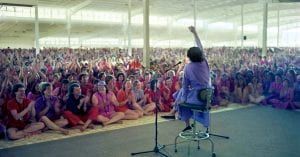
It’s worth noting that the egalitarianism of Rajneeshpuram was likely Sheela’s doing. While Sheela maintains throughout the documentary that everything she did was directly under Bhagwan’s orders, we get glimpses of who he really was after he and Sheela part ways. In those moments, he is petty, vindictive, and undeniably sexist. He fights a PR war with Sheela using the most gendered accusations possible, blaming her for being on drugs (and not in control of her faculties), and even stating “I don’t have sex with secretaries.” This is the man who came up with all that gender equality talk? I don’t think so.
Lest people cry anti-feminist over Sheela’s choice to pose nude for magazines, I’d argue there’s no denying that Sheela’s nudie pics are more empowering than they are submissive, because they are truly about the power that comes from being comfortable in one’s own skin as a sexual being. For Sheela, her sexuality is almost besides the point. Her sexual freedom is such a matter of course for her that she never stops to question the implications of having multiple sex partners or putting her body up for display. Sheela is not about to let you determine her narrative. She’ll do whatever the hell she wants, and she’s not the slightest bit concerned with what anyone thinks about it. Ultimately, isn’t that autonomy exactly what feminism is all about?
Despite the many references in Wild Wild Country to Sheela’s crimes, I found myself cheering her on. And this is precisely where her power lies. While history is filled with beloved male leaders who have committed ethically dubious decisions in the name of protecting their communities, so few female leaders have been afforded this dignity. Within the context of Oregon in the 1980s, Sheela’s determination to expose the darker side of American identity deserves the same nuanced perspective. In its time, given the context, Sheela was a determined, courageous leader; one of the joys of watching the documentary is that it grants her that rightful place.
Sheela did make mistakes, some of them unambiguously awful, and some too calculated and ruthless to be brushed off as errors in judgment. The worst, perhaps, was to bus in thousands of homeless people when it served her own political purposes, then, when her election-rigging failed and they became restless, to drug them (though she denies any involvement in this). And then, when it became clear they were hurting the stability of the community, to expel the same homeless people out of Rajneeshpuram suddenly and cruelly. But again, human history is filled with examples of glorified and exalted men who are revered as great because of their leadership, intellect, and wit, and whose reprehensible actions are excused as a necessary response to the trying times in which they led.
As we now start to reckon with changing societal norms around race, religion, nationality, and gender, this seems a particularly apt time to reevaluate our definitions of leadership and the norms we ascribe to “great” people. Sheela embodies all of the qualities we have historically lauded men for, and she did it confidently, unapologetically, and best of all, competently. Thirty-some years later, this feels like a reason to celebrate her.
This edition of Controversial Girl Crush comes to you courtesy of KB.
Related

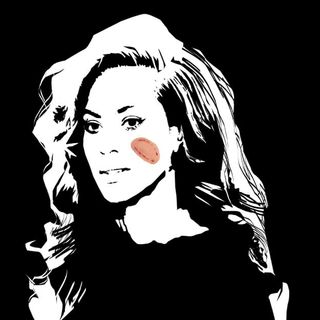
The Buzz Cut: Who Bit Beyoncé?!
